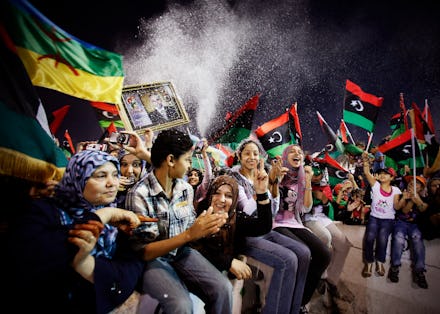In Pre-Revolutionary Libya, We Had One Tyrant — "Now We Have Many"

As my cousin in Libya recently put it, "Under Gaddafi, we had one tyrant ... Now, we have many."
Last Thursday, heavy fighting broke out between rival militias in Tripoli's Suq al-Juma'a neighborhood, where much of my family lives. Our initial excitement and optimism following the defeat of Muammar Gaddafi is turning into frustration and impatience.
Many have lost confidence in the government's ability to provide security. In my family, the youth are growing disenchanted by the lack of new opportunities as unemployment remains high. Libya’s revolution has stagnated as a result of the transitional government’s inability to establish its authority and fulfill its mandate. Due to a lack of security, the absence of state institutions, and a legacy of regionalization, the nation’s political transition will likely remain slow and difficult going forward.
The recent armed confrontation in Tripoli reportedly began when a Misrata-based militia launched an attack to avenge the death of one of its commanders. However, Misrata city officials moved quickly to distance themselves from the group responsible. Additionally, a militia group kidnapped Prime Minister Ali Zeidan, but he was released unharmed the same day last month. Similarly, in the east, Benghazi remains plagued with political assassinations. Such incidents have increasingly become the norm.
The lack of progress in state-building is linked closely to Libya’s tenuous security situation. As James Traub explained in an article for Foreign Policy, "Libya seems to keep approaching a brink and then backing off. The Zeidan kidnapping ended peacefully; rumbles between militias rarely lead to large numbers of killings."
However, even without major bloodshed, the militias and their use of force damage Libyan society and affect more than just safety and security. Their actions are also detrimental to the economy. Militias have taken control of oil fields and ports in order to pressure the government to meet their demands resulting in reduced production and income. The General National Congress (GNC) cannot contain the militias, which erodes what little confidence the public has in its elected representatives.The main challenge for the GNC, as it leads the political transition, is disarming and/or integrating these groups into the national army.
Libya’s leaders, politicians, and youth have a daunting task before them. The country desperately needs a constitution, a functioning national government, and a return to law and order. Gaddafi’s demise left a power vacuum and his dismantling of the state has left Libyans with no foundation upon which to build a new nation. A recent article, "Tracking the Arab Spring: Libya Starts from Scratch," explains Libya’s predicament best: "The GNC faces the troubling double task of having to institutionalize itself while trying to manage the democratic transition at the same time."
The GNC’s current term is nearly over. Due to the GNC’s inability to lead the transition and maintain security, some groups are protesting an extension of the current GNC authority and calling for new elections. It’s unclear what direction Libya’s next transitional phase will take, but the decline is likely to continue until national reconciliation takes place or some party gains the upper hand.
The success of the revolution will be a long and hard fought process, especially as some try to co-opt the revolution to advance their own agendas.